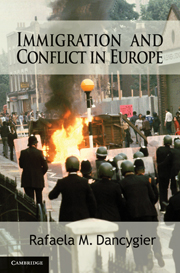Book contents
- Frontmatter
- Contents
- List of Figures and Tables
- Acknowledgments
- PART I GENERAL INTRODUCTION AND THEORETICAL FRAMEWORK
- PART II INTRODUCTION TO PART II
- PART III INTRODUCTION TO PART III
- PART IV INTRODUCTION TO PART IV
- 9 Conclusion
- Appendix A Coding Large-Scale Instances of Immigrant–Native and Immigrant–State Violence
- Appendix B Data and Variables: Immigrant Turnout
- References
- Index
- Titles in the series
9 - Conclusion
Published online by Cambridge University Press: 17 November 2010
- Frontmatter
- Contents
- List of Figures and Tables
- Acknowledgments
- PART I GENERAL INTRODUCTION AND THEORETICAL FRAMEWORK
- PART II INTRODUCTION TO PART II
- PART III INTRODUCTION TO PART III
- PART IV INTRODUCTION TO PART IV
- 9 Conclusion
- Appendix A Coding Large-Scale Instances of Immigrant–Native and Immigrant–State Violence
- Appendix B Data and Variables: Immigrant Turnout
- References
- Index
- Titles in the series
Summary
According to recent population projections, positive net migration will be the only source of population increase in Europe by 2015 (Eurostat 2008). Even at the end of the twentieth century, immigration outpaced emigration in most advanced democracies, with most arrivals settling in urban areas. Cities across Europe, already culturally and ethnically diverse, will become even more so as immigration continues and native fertility rates remain low. In the United States, where non-Hispanic whites are poised to lose their majority status in the next several decades, one in three households residing in larger cities reported speaking a language other than English at home in 2006.
Reviewing the Argument
This diverse reality underscores the urgency of answering the central question that I have pursued in this book: What explains conflict between immigrants and natives and between immigrants and the state in local areas of settlement? Though scholarship has addressed the domestic consequences of immigration from various angles, few have tackled this question systematically. This book has sought to fill this void by clarifying when, where, and why sustained clashes between immigrants and natives and between immigrants and the state emerge. Throughout this book, I have illuminated the economic bases of both types of conflict. Simply put, natives are much more likely to turn against their immigrant neighbors, and immigrants are much more prone to engage in confrontations with state actors, when each group faces economic shortages. Resource scarcity – not ethnic difference – is the key driver of immigrant conflict.
- Type
- Chapter
- Information
- Immigration and Conflict in Europe , pp. 292 - 298Publisher: Cambridge University PressPrint publication year: 2010



